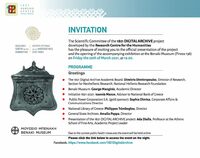-
-

Book
-
-
-
-
-
-
-
-
-
“Representations of Modern Greece in Victorian Popular Culture” (REVICTO) is a project funded by the Hellenic Foundation for Research and Innovation (HFRI) under the “First Call for HFRI Research Projects to support Faculty members and researchers and the procurement of high-cost research equipment grant”.
This project will investigate the ways in which British Victorian popular literature and culture represented and interpreted nineteenth-century Greece in magazines, journals, and other publications, with an aim to contribute to the scholarship on the cultural affiliations between Britain and Greece in the Victorian period.
An investigation of the literary and cultural exchange between Britain and Greece in the period of the latter’s formation as a nation state may also lead to revisiting questions such as:
To what extent does the proliferation of literary and popular texts on Modern Greece forge a new discourse and ideology about Greece and its equivocal position within Europe?
Is there an alternative discourse to the dichotomy between a romanticized or reviled Greece?
Our research seeks not only to explore the representation of Greece in Victorian culture, but also to trace the literary and cultural exchange between Britons and Greeks in that period, documenting an active encounter rather than a passive reception.
Moreover, our project will be facilitated by the advance in digital humanities, especially in Victorian Studies, as many nineteenth-century popular sources, such as journals, newspapers, and ephemera have been digitized; in fact, our research intends to be part of the field of digital literary scholarship.
During the three year duration of the project (2020-2023), we plan to organize conferences and research workshops as well as disseminate our research through publications and presentations at international conferences.
From the program's description.
-
The research programme “Sites of memory of the Greek Revolution, 19th–20th century” was created by the Centre for Modern History Research (KENI) of the Department of Political Science and History of Panteion University in collaboration with the Foundation of the Hellenic Parliament for Parliamentarism and Democracy from 2018 to 2020. Academically responsible was Christina Koulouri, professor of Modern History.
The object of the research was the creation of an electronic archive of the newest public monuments (statues, busts, heroes, columns, etc.) of Athens, as well as municipalities emblematic of the history of the Struggle (Tripoli, Patras, Nafplio, Messolonghi, Ermoupoli), in order to visualise the way of commemorating the major event of Greek national history.
(Edited and translated description from organiser’s website)
-
The Research Unit for the Documentation and Study of the Greek War of Independence and the Reign of Otto aims at gathering documentation and at researching fields related to the history of the Greek War of Independence. To this end, the unit has created an e-Lexicon of the Greek War of Independence, which already comprises approximately 200 entries for political, administrative and military institutions, diplomatic acts, people, places etc. Furthermore, the unit gathers both hard copies and digital documents of period (unpublished texts, archives, published oral narratives and interviews etc).
The creation of an electronic archive, the formation of a relevant bibliographical guide, as well as the writing of short studies and articles (all available online) belong to the main aims of the unit. Its ultimate goal is the configuration of an online academic centre for the dissemination and publication of resources relevant to this thematic field that may serve as an archive as well as a research and teaching tool.
(Edited and translated description from organiser’s website)
-

-
-
Article
-
-

Exhibition
-

Exhibition
-
Exhibition
-

Exhibition
-

Exhibition
-

Speech/Lecture
-
Speech/Lecture
-
The page presents an anthology of articles and opinions on the occasion of the anniversary of the start of the Greek Revolution of 1821 in order to highlight the opinions and issues discussed with a focus on the nationalist narrative discourse.







